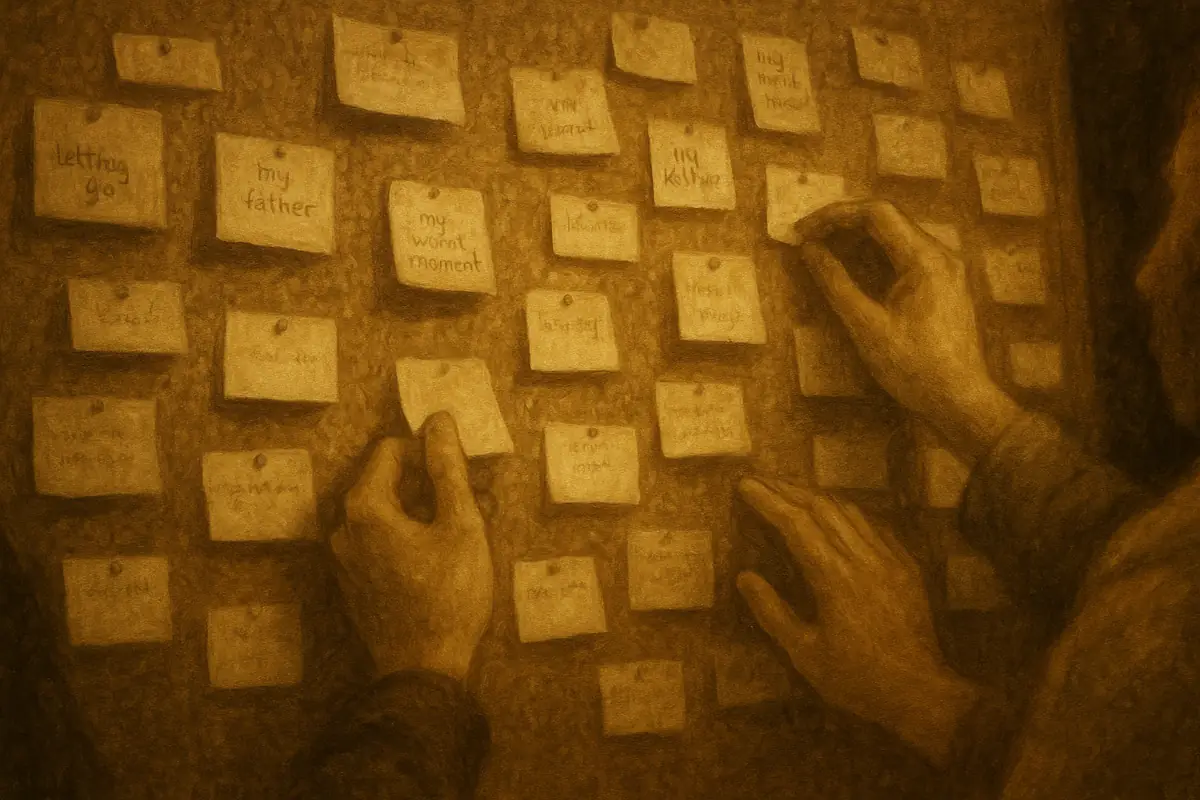The Weight We Carry: Four Stories of (Almost) Forgiveness
Prologue: The Body Remembers
Resentment doesn’t live in the mind. It settles in the body—a slow-creeping stiffness in the shoulders, a weight behind the sternum, a breath that refuses to sink. Science calls it a stress response, a relic of survival. But Margot knew it as the way her hands tightened around the grocery cart when she saw him. Jonas felt it as a wave of heat behind his eyes at the flash of a letterman jacket. Lily recognized it in the sudden hollowness beneath her ribs when his name was spoken. Colin measured it in the way his lungs stilled at the sound of a spoon against ceramic.
None of them would call it by its name. Not yet.
Forgiveness, after all, is not a single act but a series of small releases—a loosening of the grip, muscle by muscle, memory by memory.
Margot: The Bumped Cart
The grocery store was nearly empty when Margot turned into the produce aisle. The fluorescents hummed faintly overhead, a sound she’d long stopped noticing until it was the only thing left to focus on. She pushed her cart slowly, studying the fruit without touching it, as if the wrong choice might unravel her.
Then the impact—a jolt as her cart met another. She looked up, apology ready, and froze.
Her brother stood on the other side. Taller than last time. His hair was longer, his posture rigid, but his eyes were the same: dark, guarded, as if bracing for her words to cut.
Nine months of silence collapsed into this moment. No returned calls. No texts except the one that had seared itself into her thoughts: You left me when I needed you.
He didn’t move toward her. Didn’t step back. Just gave the slightest nod—more reflex than greeting—and turned his attention to the avocados.
The air between them thickened. Margot’s pulse drummed in her wrists. She could say something. She could walk away. Instead, she stood there, suspended, until he pushed past without a word.
In her pocket was a slip of paper, folded and refolded until the creases had gone soft. She’d written the words months ago after overhearing a coworker: Forgive because you’re tired of carrying what hurts.
She stepped to the side, out of the flow of shoppers, and pressed her fingertips to the ridge of her cheekbone—the spot the hospital therapist had shown her years ago.
Tap. Even though seeing him makes the old anger flare, I’m allowed to pause.
Tap. He is hurt. I am hurt. I don’t have to fix it today.
The heat in her chest didn’t vanish. But its edges blurred, just enough to let her breathe.
She walked to the checkout, the paper still tucked in her pocket. She didn’t speak to him. She didn’t throw the words away.
Jonas: The Letterman Jacket
The traffic light held red longer than usual. Jonas sat at the wheel, fingers drumming against the steering column, when the flash of a letterman jacket caught his eye. A car rolled past, windows down despite the cold, two kids laughing inside.
For a fraction of a second, the passenger looked exactly like him—the kid he’d coached for three seasons, the one who’d stayed late after practice to work on his swing, who’d once said, You’re the reason I made varsity. The same kid who’d later stood in front of a school board and called him unfair.
Jonas’s grip tightened. The memory of the hearing rushed back—the way the room had tilted when the video played, the way no one met his eyes after.
He pulled over before the anger could steer for him. The dashboard clock ticked softly. He reached into the glove compartment and pulled out the handout from the community center—the one with the line at the bottom: When things spike, touch your body and tell the truth.
He pressed two fingers to the space beneath his collarbone.
Tap. Even though I still feel burned when I think of him, I’m safe here in this car.
Tap. I did good things. I missed things. Both can be true.
The tightness in his shoulders eased, just slightly. He rolled the window down, let the cold air rush in, and drove home.
Lily: The Sugar Shard
The dinner rush had barely begun when the comment landed. One of her servers leaned in at the pass and said, Heard about Sam. That sucks, before disappearing into the dining room. The words were nothing. The tone—casual, almost careless—was everything.
Lily’s hands stilled. The kitchen noise faded beneath the sudden roar of memory: the suitcase by the door, the silence where his voice should have been, the restaurant they were supposed to open together.
She stepped out back into the alley, the brick wall cool against her shoulder. The clatter of pans inside was muffled now.
She raised her hand, tapping the side of it lightly.
Tap. Even though his name can still tilt my world, I’m allowed to protect my heart.
Tap. He left. I stayed. I built this kitchen. I’m tired of blaming myself.
When she walked back in, her hands were steady. She plated the dessert—raspberries beneath a delicate sugar shard—and allowed herself a small, quiet pride. Not for him. For herself.
Colin: The Spoon’s Echo
The sound came through the café wall—a spoon against ceramic, rhythmic and familiar. Colin froze. It was the exact pattern she’d used, the one he’d teased her about. Who stirs tea like they’re conducting an orchestra?
In an instant, he was back in their kitchen, the morning before the accident. The argument. The words he couldn’t take back. The apology that hadn’t felt like enough.
The fridge at home still held the flyer from the library talk he’d stumbled into: Forgiveness begins where the nervous system unclenches. He hadn’t gone for answers. But the words had followed him anyway.
He stepped outside, into the thin winter sunlight, and pressed his fingers to the space beneath his collarbone.
Tap. Even though I said things I can’t undo, I won’t abandon myself here.
Tap. I miss her. I wish I’d been kinder. I’m still learning how to be.
The spoon’s sound still ached. But it no longer owned him.
Convergence: The Winter Fair
Weeks later, the community center hosted a winter fair—folded tables lined with baked goods, flyers curling at the edges, the murmur of conversation weaving through the room.
Margot came because a coworker had insisted. Jonas helped set up the chairs. Lily dropped off pastries and lingered. Colin wandered in because the sign said Free.
They didn’t speak. Didn’t even notice one another. But they shared the same air.
Near the back, a corkboard displayed a question: What are you not ready for yet? Scraps of paper filled the space—Calling my father. Letting go of his sweater. Believing I’m not defined by my worst moment.
Across the room, a man with a quiet voice said, Resentment tells you where you’re still tender. It doesn’t have to be the whole story.
Margot’s fingertips brushed the edge of a note. Jonas tapped once, absently, near his temple. Lily rested her wrist against her collarbone. Colin touched the flyer in his pocket.
None of them would call it forgiveness.
But each walked out carrying a little less than they’d brought in.
A Note on the Practice
The tapping sequences in these stories are inspired by Emotional Freedom Techniques (EFT), developed by Gary Craig, which combines somatic pressure points with mindful acknowledgment of emotional pain. The underlying philosophy—that healing begins when we “meet the mess with mercy”—reflects his belief in the body’s capacity to release what the mind clings to.
The theme of forgiveness as a release of burden rather than an act of absolution echoes the work of Dr. Fred Luskin, whose research at Stanford University reveals how resentment traps us in “grievance stories.” His finding that “forgiveness is giving up all hope of a better past” lives in Margot’s folded paper, Jonas’s glove compartment handout, and Colin’s library flyer.
Neither would call this a cure. But both would recognize these small, stubborn acts of return—to the body, to the present, to the self—as the quiet heart of healing.



